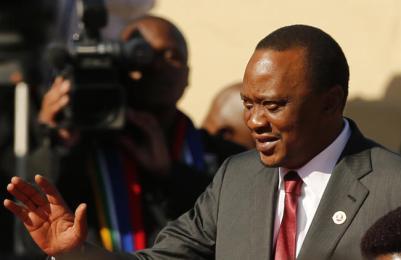Kenyan president tells South Sudanese governors to embrace peace
February 11, 2015 (NAIROBI) – Kenyan president Uhuru Kenyatta has called on the visiting governors from the troubled South Sudan to embrace peace by honouring agreements signed to end the 14-month old civil war in the country.

They in particular rejected the proposal by mediation which reinstated the rebel leader Riek Machar as first vice president in a transitional government of national unity.
The mission to meet the East African leaders was to try to shape the IGAD proposal in the interest of the government.
President Kenyatta however advised the top state executives to rise above their differences and work towards ending the war and suffering of their people.
“It is disheartening to see that the situation in South Sudan is not getting any better. It is time the conflict was brought to a conclusive end,” president Kenyatta said in a statement after meeting the governors on Wednesday.
The Kenyan president who also serves as rapporteur in the regional bloc, the Intergovernmental Authority on Development (IGAD) that mediates the peace process between the warring parties, lamented that it was unfortunate that South Sudanese leaders have not honoured and fully embraced agreements they have signed.
He said South Sudan should only be using its army to defend its sovereignty but political differences need to be resolved peacefully.
“The barrel of a gun should only be used in defending South Sudan’s sovereignty, but problems should be resolved through dialogue,” he said, calling on the parties to be inclusive in the peace process.
The governors were aroused mainly by the proposal which suggested that former vice-president of South Sudan, Riek Machar, turned leader of the Sudan Peoples’ Liberation Movement (SPLM-IO) would become the first vice president after president Kiir.
The incumbent vice-president James Wani Igga, president Kiir’s loyalist, would take the second vice-presidency position.
Three governors of Greater Equatoria region last week travelled to the venue of the talks in Addis Ababa where they presented a petition to president Kiir and IGAD mediation not to reinstate the rebel leader, Machar, in the first vice-president’s position.
The government wanted Machar to either have equal status with the incumbent Igga or be pushed to the third position after Igga.
President Kiir this week vowed not to “reward” the rebel leader for his rebellion, also citing the country’s transitional constitution which had not provided for a position of first vice-president.
Equatoria governors also abandoned their initial quest for federalism as part of a peace agreement that would be implemented in a transitional government of national unity and recently succumbed to the government’s suggestion that the issue would only be deferred to a permanent constitutional making process for consideration.
REBELS NOT AGREED
Rebel officials also told Sudan Tribune that the leadership proposal from IGAD needed further consultations with their constituency as resolutions of the Pagak conference in December 2014 called on president Kiir to step down, never to lead a transitional government.
The rebels accuse president Kiir of massacring thousands of civilians in the capital, Juba, also they say he cannot be trusted to make the necessary reforms.
The Pagak resolutions also adopted the initial proposal by IGAD with president and prime minister, or deputies to the prime minister.
Rebels have been criticising IGAD for what they said had been “insistency in ever changing proposals, conflict of interest and reluctance to address the root causes of the conflict.”
They also accuse IGAD of failure to persuade Uganda to withdraw its thousands of troops fighting on president Kiir’s side in order to implement the cessation of hostilities agreement the regional bloc brokered.
The situation also suggested that the rebel group may not agree to the position of the first vice-president as long as Kiir remained the president. However, regional and international officials exert important pressures on the two warring parties to accept the proposed deal in March.
The two warring parties could not agree on the leadership structure and power-sharing ratios in the recent round of peace talks which brought face-to-face the two principals, forcing IGAD to postpone its summit.
There are also many other critical outstanding issues to be negotiated and agreed upon such as on governance, security arrangements, wealth-sharing, reforms, justice, accountability and reconciliation.
IGAD has given up to 19 February for the two principals to consult with their respective constituencies and sign a final peace agreement by 5 March.
Observers express pessimism to beat the dateline given the many issues that are yet to be negotiated, coupled with repeated violations of the cessation of hostilities agreement signed since 23 January 2014.
(ST)
